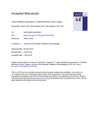
research Acne
4 citations,
January 2019 Acne is a common skin condition that can be influenced by diet, lifestyle, and hormones, and requires a treatment approach that includes psychological considerations.
 4 citations,
January 2014 in “Dermatology”
4 citations,
January 2014 in “Dermatology” A woman with acne and baldness was found to have a rare ovarian condition but successfully had a child through fertility treatment.
4 citations,
September 2006 in “Prescriber” Use topical retinoids for most acne cases, sometimes combined with other treatments.
research Acne
4 citations,
May 1978 in “JAMA” Don't ignore acne treatment to avoid scars and emotional trauma.
 4 citations,
June 2021 in “Dermatology”
4 citations,
June 2021 in “Dermatology” Scientists created a 3D skin model to study a chronic skin disease and test treatments.
 3 citations,
December 2019 in “Journal of Dermatological Treatment”
3 citations,
December 2019 in “Journal of Dermatological Treatment” Acne in adult women may occur alone or with signs of high male hormones.
 3 citations,
August 2019 in “Journal of The American Academy of Dermatology”
3 citations,
August 2019 in “Journal of The American Academy of Dermatology” Higher doses of spironolactone may improve acne in PCOS patients, but side effects are a concern.
 3 citations,
January 2018 in “Postępy Dermatologii i Alergologii”
3 citations,
January 2018 in “Postępy Dermatologii i Alergologii” Longer TA repeats in the SRD5A2 gene may increase acne risk in Chinese people.
 3 citations,
July 2011 in “Journal of the Egyptian Women's Dermatologic Society (Print)”
3 citations,
July 2011 in “Journal of the Egyptian Women's Dermatologic Society (Print)” Acne is common in adult women, often continues from adolescence, and can lead to scarring.
3 citations,
May 2007 in “Clinical and Experimental Dermatology” Hair does not prevent acne.
 3 citations,
March 2011 in “Informa Healthcare eBooks”
3 citations,
March 2011 in “Informa Healthcare eBooks” Acne in children varies by age and severity, requires a pediatric treatment approach, and may need diagnostic evaluation for underlying conditions.
2 citations,
October 2021 in “Journal of Cosmetic Dermatology” Finasteride is more effective and satisfactory than montelukast for treating moderate acne in women.
 2 citations,
August 2021 in “Australasian Journal of Dermatology”
2 citations,
August 2021 in “Australasian Journal of Dermatology” Acne in adult women is often linked to polycystic ovary syndrome, especially in those who are younger, have premenstrual acne flare-ups, and irregular periods.
 2 citations,
February 2019 in “Journal of dermatological treatment”
2 citations,
February 2019 in “Journal of dermatological treatment” A new surgical technique effectively cures acne in most patients.
 2 citations,
November 2018 in “Clinical and Experimental Dermatology”
2 citations,
November 2018 in “Clinical and Experimental Dermatology” Acne is more common in men with male pattern baldness due to increased hormone levels.
2 citations,
January 2018 in “Elsevier eBooks” Probiotics and dietary changes can help treat acne.
 2 citations,
September 2016 in “Journal of skin and stem cell”
2 citations,
September 2016 in “Journal of skin and stem cell” Acne is strongly linked to high BMI, hair loss, menstrual issues, family history, and eating too many sweets and fatty foods, but not to excessive hair growth.
 2 citations,
January 2014 in “Springer eBooks”
2 citations,
January 2014 in “Springer eBooks” Polycystic Ovary Syndrome (PCOS) often leads to severe acne, and lifestyle changes and hormonal treatments can help manage it.
 2 citations,
July 2011 in “Journal of the Egyptian Women's Dermatologic Society (Print)”
2 citations,
July 2011 in “Journal of the Egyptian Women's Dermatologic Society (Print)” Eating nuts, chocolate candy, and red tea might worsen acne, while eating more fresh vegetables could reduce it.
 2 citations,
July 2008 in “Paediatrics & child health”
2 citations,
July 2008 in “Paediatrics & child health” Severe acne in a young girl may indicate underlying hormonal issues.
 2 citations,
July 2004 in “Proceedings of SPIE, the International Society for Optical Engineering/Proceedings of SPIE”
2 citations,
July 2004 in “Proceedings of SPIE, the International Society for Optical Engineering/Proceedings of SPIE” Near-infrared laser therapy with Indocyanine Green dye improves acne by reducing inflammation without side effects.
 2 citations,
January 2002 in “The Journal of Korean Medicine Ophthalmology and Otolaryngology and Dermatology”
2 citations,
January 2002 in “The Journal of Korean Medicine Ophthalmology and Otolaryngology and Dermatology” Sophora flavescens extract helps hair grow and prevents acne.
2 citations,
May 1984 in “Current Problems in Pediatrics” Pediatricians can effectively treat most acne cases with the right knowledge and patient involvement.
 2 citations,
May 2023 in “Experimental dermatology”
2 citations,
May 2023 in “Experimental dermatology” New imaging techniques can assess and track changes in mouse acne without harm, aiding treatment choices.
2 citations,
December 2019 in “Colombia medica” A patient with a rare scalp condition showed improvement with isotretinoin and other medications.
 2 citations,
May 2019 in “Journal of the American Academy of Dermatology”
2 citations,
May 2019 in “Journal of the American Academy of Dermatology” Facial hidradenitis suppurativa can be mistaken for acne but requires different treatment.
2 citations,
January 2019 in “Egyptian Journal of Dermatology and Venereology” Insulin might be involved in causing hair loss and acne.
 2 citations,
January 2014 in “Advanced Biomedical Research”
2 citations,
January 2014 in “Advanced Biomedical Research” Oral isotretinoin and cyproterone compound are equally effective for treating acne in women with cutaneous hyperandrogenism.
2 citations,
January 2013 Metformin improves acne, hair growth, and menstrual cycles in females with PCOS.
 2 citations,
June 2012 in “Journal of Cosmetic Dermatology”
2 citations,
June 2012 in “Journal of Cosmetic Dermatology” Hair transplant using beard hair made acne scars on cheeks less visible with minimal scarring in the donor area.





















